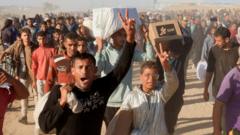The GHF was established after a three-month blockade of Gaza by Israel, which the NGOs argue has resulted in grave violations of humanitarian principles. They claim that the aid system has forced millions into crowded, militarized zones where they are routinely at risk of gunfire from both Israeli forces and militant groups. Reports from medics and the Hamas-run health ministry have indicated that Israeli soldiers have been firing on civilians at GHF distribution sites, a claim that Israel has vehemently denied.
This group of international charities criticized the shift from 400 aid distribution points to only four military-controlled locations, highlighting the inherent danger faced by Palestinians as they navigate these sites. The humanitarian organizations released a statement saying, “Today, Palestinians in Gaza face an impossible choice: starve or risk being shot while trying desperately to reach food to feed their families.” The impacts of this shift have been severe, with children particularly vulnerable—making up a significant portion of those harmed during aid-seeking endeavors.
Both the UN and numerous advocacy groups have condemned the GHF for its operation. UN Secretary-General Antonio Guterres described the GHF approach as "inherently unsafe," echoing previous criticisms that the initiative militarizes aid efforts and ignores the existing distribution networks designed to protect civilians.
Furthermore, revelations from Israeli media have reported on IDF soldiers claiming they were ordered to disperse unarmed civilians near aid sites, although these allegations were dismissed by Israeli Prime Minister Benjamin Netanyahu. The Israeli military stated they were investigating these claims while announcing improvements to the distribution system, including new fencing and warning signs.
Despite these reassurances, the coalition of over 130 organizations maintains that the GHF is not a suitable response to the dire circumstances in Gaza, where food scarcity and famine-like conditions are ever-present. They stressed the urgent necessity for a humanitarian framework that prioritizes the safety and well-being of vulnerable populations amidst the ongoing conflict.
This group of international charities criticized the shift from 400 aid distribution points to only four military-controlled locations, highlighting the inherent danger faced by Palestinians as they navigate these sites. The humanitarian organizations released a statement saying, “Today, Palestinians in Gaza face an impossible choice: starve or risk being shot while trying desperately to reach food to feed their families.” The impacts of this shift have been severe, with children particularly vulnerable—making up a significant portion of those harmed during aid-seeking endeavors.
Both the UN and numerous advocacy groups have condemned the GHF for its operation. UN Secretary-General Antonio Guterres described the GHF approach as "inherently unsafe," echoing previous criticisms that the initiative militarizes aid efforts and ignores the existing distribution networks designed to protect civilians.
Furthermore, revelations from Israeli media have reported on IDF soldiers claiming they were ordered to disperse unarmed civilians near aid sites, although these allegations were dismissed by Israeli Prime Minister Benjamin Netanyahu. The Israeli military stated they were investigating these claims while announcing improvements to the distribution system, including new fencing and warning signs.
Despite these reassurances, the coalition of over 130 organizations maintains that the GHF is not a suitable response to the dire circumstances in Gaza, where food scarcity and famine-like conditions are ever-present. They stressed the urgent necessity for a humanitarian framework that prioritizes the safety and well-being of vulnerable populations amidst the ongoing conflict.



















